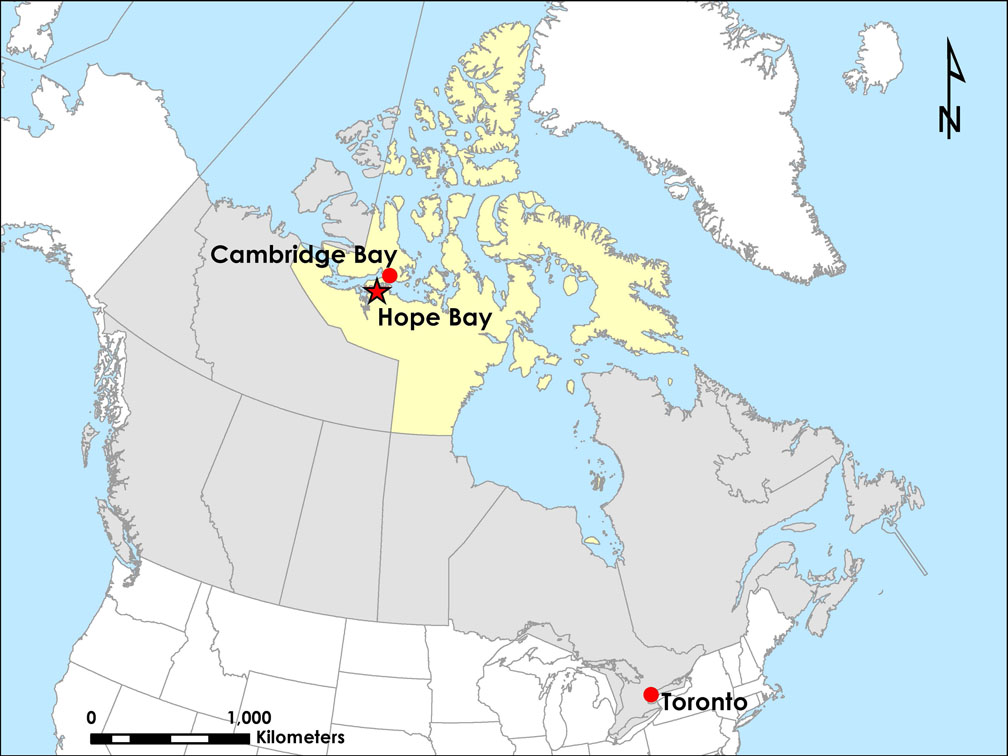China’s interest in a Nunavut gold mine is commercial, legal expert says
The deal looks more like a business move than a challenge to Canadian sovereignty, says international law scholar Michael Byers.

The recent news that TMAC Resources Inc., a Canadian junior mining company in western Nunavut, wants to sell its Hope Bay gold mine to a huge Chinese mining company, Shandong Gold, has alarmed some Nunavut residents.
That’s understandable, but Shandong Gold, better known as SD Gold, just wants to make money, says Michael Byers, a legal scholar who holds the Canada Research Chair in Global Politics and International Law at the University of British Columbia and is the author of “Who owns the Arctic?”
[Nunavut’s Hope Bay goldfields to be bought by China’s SD Gold]
While general concerns about the probable sale of the mine to the Chinese-controlled company are justified, the Hope Bay acquisition looks more like a good business deal than a challenge to Canadian sovereignty, Byers said.
A lot of Canadian mining companies are now open to foreign acquisition due to the collapse of the economy and of commodity prices resulting from the COVID-19 pandemic, he said.
At the same time, many Chinese companies, like SD Gold, have “very deep pockets and are resilient to the downturn,” he said.
“And they are finding that Canadian mining companies are available at fire sale prices.”
SD Gold is willing to pay $207.4 million for Hope Bay, which this past year produced about 32,290 ounces of gold.
China has a “massive appetite for natural resources,” like gold, Byers said.
“But there’s a great deal of anxiety concerning China’s power and its international politics these days,” he said.
[With a $12.1 million offer to Greenland, America is playing softball in the Arctic]
“We’re dealing with a pandemic that originated in China, and we have a couple of Canadians detained in China and, at the same time, we have China emerging as the most powerful economic force in the world.”
So when you put the China anxiety on top of the Arctic anxiety, many people become “very sensitive,” Byers said.
“I think that’s the reason for much of the concern — there is the perception that a foreign power might take over our Arctic,” he said.
However, he said gold is not “a product of national security,” such as rare-earth elements or lithium, with their high-tech applications in the energy, transportation and telecommunications sectors.
Gold is an investment product, so there’s “no immediate national security issue,” Byers said.
“They want to make money,” he said. “So far the Chinese interest in the Arctic seems to be mostly commercial.”
Chinese companies are looking for good deals in the Canadian Arctic and as this economic downturn continues, they will be looking for more good deals, he said.
Overall, what’s good about the possible Hope Bay acquisition is that it’s commercial, it involves gold, it’s relatively small, and there’s a necessary element of co-operation with Inuit, Byers said.
Another plus: the mine is located off the deep-water route of the Northwest Passage.

But, while the acquisition of Hope Bay by a Chinese company doesn’t set off Byers’ alarm bells, he said “it does awaken us to a wave of further acquisition of other projects that would require closer scrutiny.”
“Canadians are right to be concerned about China in the Canadian Arctic, but my message is that this isn’t a situation where we should say no to everything Chinese companies want to do, but a situation where we need to be vigilant and do a careful review of the proposal, and impose conditions and restrictions, and then we enforce them,” he said.
If everyone is careful, there could be benefits from Chinese investments.
“It’s not about closing the door; it’s about engaging a rigorous review and continuous oversight,” Byers said.
Canada manages economic relations with more than 100 countries and not all have been democratic, he said.
“China is the new economic superpower, and the reality is we need to figure out ways to work with China that give us benefits but also protect us,” he said.
The situation with the Hope Bay acquisition might be different if the proposal did not involve Inuit, said Byers, who praised the negotiators of the Nunavut land claim who made sure that Inuit-owned lands included mineral-rich areas like Hope Bay.
If Inuit involvement through the Kitikmeot Inuit Association weren’t part of the deal, the federal and territorial government would have to ensure that the mine wouldn’t become a fly-in operation for workers from China, Byers suggested.
TMAC said earlier this year that finding a buyer for its mining operation would provide the necessary money for the mine’s development.
TMAC is in even more of a bind now due to the pandemic, having sent its Nunavut-based workers home, reduced its staff to 120 and cut its production to processing stockpiled ore.
TMAC said on May 12 that SD Gold has “the financial strength, technical capability and long-term vision to maximize the value of the Hope Bay property.”
Without the deal with SD Gold, the mine may simply close down operations, which would be a loss to Nunavut workers, businesses, Inuit organizations and governments.
“If the risk of COVID-19 continues, TMAC may execute a controlled transition into temporary care and maintenance and resumption of full operations would likely begin with a period of rebuilding ore stockpiles,” said Jason Neal, president and chief executive officer of TMAC, this week in a news release.